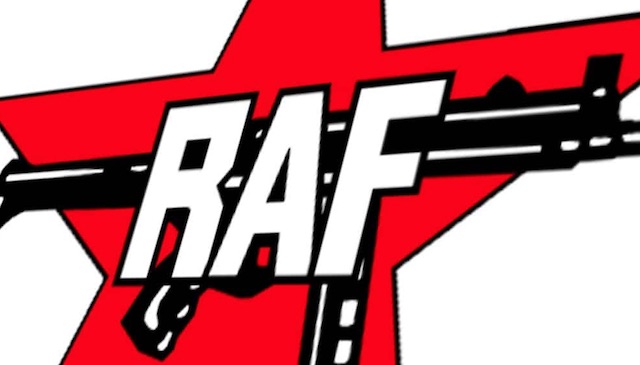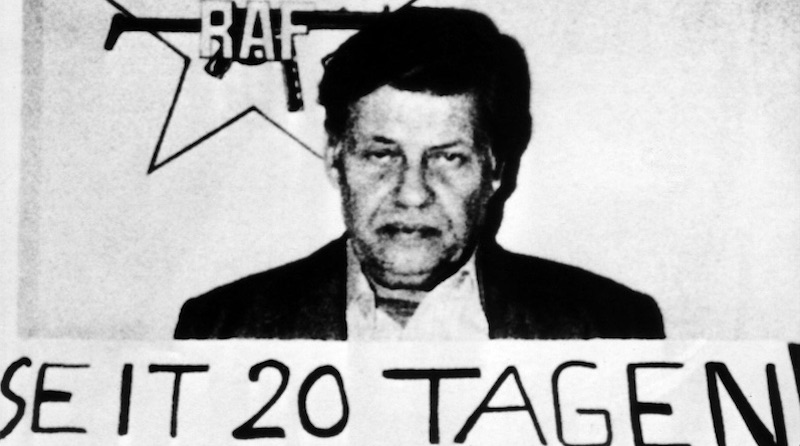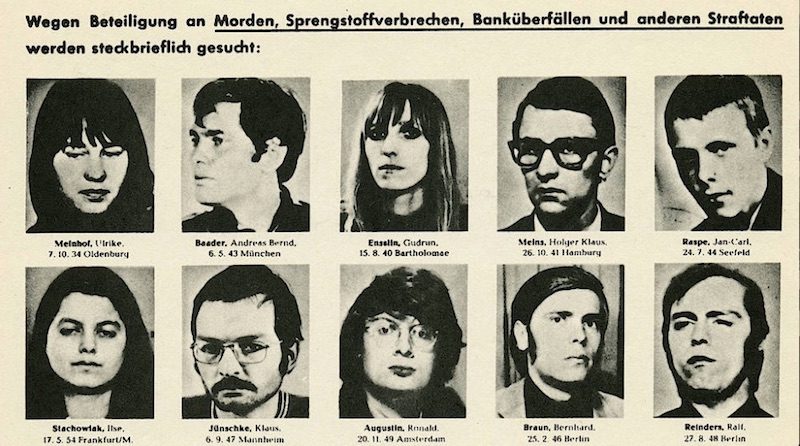Hol Dir den wöchentlichen SPARTANAT-Newsletter.
Dein Bonus: das gratis E-Book von SPARTANAT.

TERRORISMUS (4): Der Deutsche Herbst 1977
Der deutsche Herbst liegt nun 40 Jahre hinter uns. Es werden immer noch Parallelen zum heutigen Terrorismus gezogen.
40 Jahre liegt der Deutsche Herbst mittlerweile zurück. Noch immer werden Parallelen zum heutigen Terrorismus gezogen. Entscheidender sind wohl die manifesten Unterschiede. Besonders die Auswahl der Ziele: Wurden damals ausschließlich Spitzenpolitiker und andere hochrangige Mitglieder der Gesellschaft angegriffen, zielt der heutige Terrorismus auf die Zivilbevölkerung.
Der islamistische Terror zielt auf die Zivilbevölkerung: auf öffentliche Plätze, stark frequentierte (Einkaufs-)Straßen und Großveranstaltungen. Dieser Terrorismus soll theoretisch jeden treffen können, es braucht nicht einmal ein auslösendes Ereignis. Die Losung des „Islamischen Staats“, den Westen zu „hassen und zu bekämpfen“ richtet sich gegen einen Lebensstil – von der Toleranz gegenüber Homosexualität bis zum Alkoholkonsum – und gegen den Abfall vom Glauben, will heißen die fehlende Akzeptanz Allahs. Demokratie und Menschenrechte gelten in diesem Denkmuster als Frevel gegenüber Gott, als anmaßende Bevorzugung der menschengemachten Gesetze gegenüber den göttlichen. Dementsprechend wird die Gesellschaft als solche ins Visier genommen – der öffentliche Raum soll zum Angstraum werden.
Der „klassische Terrorismus“
Darin besteht der zentrale Unterschied zum Terrorismus der RAF und artverwandter Gruppen. Der „konventionelle Terrorismus“ richtete sich gegen das System, personifiziert durch hochrangige Politiker und ranghohe Mitglieder der Gesellschaft und des Staatsapparats: Der Feind waren die „verfetteten Eliten, egal ob sie in der Justiz, der Exekutive, den Parteien, Konzernen oder Medien sitzen“, wie die RAF es selbst ausdrückte.
Damit sollte eine Botschaft an den „zu interessierenden Dritten, der durch den in der Elite verbreiteten Schrecken zu Widerstand und Aufruhr motiviert werden sollte“ gesendet werden, wie der Politologe Herfried Münkler es nennt: Im Falle des Linksterrorismus sollten folglich Kritiker des als kapitalistisch-imperialistisch gebrandmarkten Systems zum bewaffneten Kampf motiviert werden. Parallel dazu sollte der Staatsapparat zu einer Überreaktion verführt werden, um seine Legitimität als Rechtsstaat zu verlieren.
Dementsprechend war die durch die Entführung des Unternehmers Walter Palmers im Jahr 1977 auch in Österreich aktive „Bewegung des 2. Juni“ grundsätzlich darauf bedacht, zivile Opfer zu vermeiden. Es ging ihr neben der politischen Bedeutung vor allem um die Finanzierung ihrer Aktivitäten durch die Erpressung von Lösegeld. Der bekannteste Akt der „Bewegung des 2. Juni“, die Entführung des CDU-Spitzenkandidaten Peter Lorenz im Jahr 1975, sollte wiederum dazu dienen, ihr nahestehende Häftlinge freizupressen. Es war die erste Entführung eines Politikers in der BRD.
Die Anschläge der „Bewegung des 2. Juni“ richteten sich außerdem gegen Einrichtungen – etwa einen britischen Yachtclub in Berlin-Gatow (bei dem aufgrund einer Verkettung unglücklicher Umstände ein Mensch ums Leben kam) als Reaktion auf den „Bloody Sunday“ 1972. Im selben Jahr wurden auf der juristischen Fakultät in Berlin Gesetzessammlungen verbrannt, nachdem ein Verfahren gegen Polizisten eingestellt wurde, die zwei RAF-Mitglieder bei einem Schusswechsel getötet hatten. („Wir wollen keine Juristische Fakultät, an der neue Schweine ausgebildet werden!“ hieß es in der damaligen Erklärung.)
Auch die RAF richtete sich gegen Vertreter des Staates und der Elite: Nachdem ihr harter Kern inhaftiert worden war und der Hungerstreik eines RAF-Mitglieds tödlich geendet hatte, wurde 1974 der höchste Richter in Berlin ermordet. Im Jahr darauf folgte ein Überfall auf die deutsche Botschaft in Stockholm, die gesprengt wurde, nachdem die deutsche Regierung nicht auf die Forderungen eingegangen war. Ebenfalls in diese Zeit fällt die Geiselnahme bei der OPEC-Konferenz in Wien durch den Terroristen „Carlos“ und fünf weitere Attentäter.
Schlüsseljahr 1977
Dem Deutschen Herbst ging eine Reihe weiterer Anschläge voraus: die Erschießung von Generalbundesanwalt Siegfried Buback, die missglückte Entführung von Jürgen Ponto, Vorstandssprecher der Dresdner Bank, der nach heftiger Gegenwehr getötet wurde, und ein versuchter Anschlag auf das Gebäude der Bundesanwaltschaft in Karlsruhe.
Der Deutsche Herbst selbst zeigte die erhöhte Gewaltbereitschaft der RAF, um die Freilassung von Andreas Baader und Gudrun Ensslin zu erzwingen. In diese Zeit fallen die Entführung von Hanns Martin Schleyer, dem Vorsitzenden des Bundesverbandes der Deutschen Industrie, und die Entführung der „Landshut“ nach Mogadischu durch palästinensische Terroristen. Nachdem die Sondereinsatzgruppe GSG 9 die Geiseln befreit hatten, nahmen sich Baader und Ensslin das Leben. Die Leiche von Schleyer wurde wenig später in einem Kofferraum in Mülhausen aufgefunden (sein Mörder wurde bis heute nicht gefunden).
Zur Rolle der Medien
Ungeachtet der Unterschiede in der Auswahl der Ziele spielten die Medien damals wie heute eine zentrale Rolle. Die Entführung von Schleyer und die RAF im Allgemeinen dominierten die Titelseiten der Monate September und Oktober. Der Historiker Walter Laqueur beschrieb den Terror als Spektakel, das Millionen Menschen faszinierte, obwohl es sie selbst nicht direkt betraf.

Die Entführung und Ermordung von Hans Martin Schleyer erschütterte die BRD. Im Bild wird er als Gefangener der Roten Armee Fraktion gezeigt.
Golo Mann sprach in der „Welt“ zwei Tage nach der Entführung Schleyers sogar von einem „neuartigen Bürgerkrieg“: „Wir befinden uns im Krieg, wir stehen zum Töten entschlossenen Feinden gegenüber. Und an diesem Krieg ist die Bundesrepublik Deutschland unschuldig wie ein Engel.“ In derselben Ausgabe war in einem Kommentar davon die Rede, dass „die Autorität des Staates als Schutzgemeinschaft aller Bürger auf dem Spiel“ steht: „Nur der Staat kann vor Terror schützen. Die Bürger erwarten von ihm die Autorität und die Kraft, die Rechtsordnung durchzusetzen.“
Die „Süddeutsche“ titelte am 7. September von „Terror in neuer Dimension“, einen Tag später verwehrte die Kolumne „Das Streiflicht“ sich dagegen, wieder zur Normalität zurückzukehren und die Terrorgefahr damit von sich zu weisen, selbst nicht betroffen zu sein: „Konnte man nicht, nach bewährtem Rezept, sogar die schrecklichen Bilder aus der Vincenz-Statz-Straße verdrängen, als stammten sie von einem Verkehrsunfall: Wir sind nicht prominent, wir sind keine Polizisten, uns kann das nicht passieren! Aber dann wird man die Bilder doch nicht los …“ Dementsprechend sollten die Bürger sich auf einen längeren, potenziell endlosen Kampf mit der RAF einstellen: „Es ist wahr – für Erste ist die Idylle gründlich kaputt. Schlimm ist das Gefühl der absoluten Ziel- (und End-)losigkeit des Gemetzels.“
Bedrohung für jeden Einzelnen
Die Medien und die Politik erklärten die RAF zu einer Bedrohung für die gesamte öffentliche Ordnung und damit jeden Einzelnen. Dementsprechend müsse man auch dazu bereit sein, Grundfreiheiten einzuschränken, um die staatliche Ordnung als Ganzes zu retten: „Die Bürger fürchten, dass die Parole „Lieber ein hilfloser als ein herzloser Staat“ ihnen womöglich einen hilflosen Staat in all seiner Herzlosigkeit bescheren könnte – „mit südamerikanischen Zuständen und am Ende südamerikanischen Lösungen“ hieß es in der „Welt“ vom 8. September. Einen Tag später wurde dort die Frage aufgeworfen, ob der Staat seinen primären Zweck – die Gewährleistung von Sicherheit – verfehlt: „Dieser Staat, der uns soviel Steuern aus der Tasche zieht – was tut er eigentlich, um seine Bürger gegen Terroristen zu schützen? Ist die Polizei denn völlig blind und hilflos?“
Die damaligen Zeitungsberichte zeichnen ein äußerst emotionales Bild, das Ängste geschürt hat. Wer die Täter und ihre Motive zu verstehen versuchte, machte sich schnell verdächtig.
Zur Mäßigung aufrufende Stimmen – etwa der Verfassungsrichter Helmut Simon – waren selten, oft musste man dafür auch einen Blick in die ausländische Presse (genauer gesagt die „Neue Zürcher Zeitung“) werfen.
Wenn heute immer wieder betont wird, dass die reale Bedrohung des Terrorismus viel geringer ist, als die Berichterstattung vermuten lässt – wenn gar behauptet wird, dass es sich beim „islamistischen Terrorismus“ um eine „konstruierte Bedrohung“ handelt –, gilt das umso mehr für den Linksterrorismus. Zur Klarstellung: In 28 Jahren RAF-Aktivität wurden in Europa ungleich weniger Menschen (33, um genau zu sein) getötet als durch den islamistischen Terror.
Die Reaktionen der Politik
Auch die Politik reagierte äußerst emotional auf die Entführung Schleyers. Der „Bayernkurier“ (das CSU-Parteiorgan) sprach von der letzten Stufe vor dem Bürgerkrieg, SPD-Fraktionsvorsitzender Herbert Wehner und Vertreter von CDU/CSU berichteten, dass das Volk auf die Wiedereinführung der Todesstrafe dränge. Dabei kursierte selbst der Vorschlag, bei Erpressungsversuchen jede halbe Stunde einen der gefangenen RAF-Terroristen zu erschießen. Auch in den Meinungsspalten und Leserbriefen war das Thema Todesstrafe äußerst prominent, bereits nach der Tötung von Jürgen Ponto hatten sich mehr Menschen für die Todesstrafe (44 Prozent) ausgesprochen als dagegen (39 Prozent).
Daneben demonstrierten Politiker ostentative Kompromisslosigkeit, wobei die damaligen Aussagen erstaunliche Parallelen zur heutigen Rhetorik aufweisen: Der „Bayernkurier“ forderte „härteste Maßnahmen“ und eine Abänderung des Grundgesetzes, Kanzler Schmidt sprach in einer Regierungserklärung von Mitte September davon, bis an die Grenzen des Rechtsstaats gehen zu wollen, Helmut Kohl bezeichnete die Entführung als einen Anschlag auf das gesamte Volk „als eine Kriegserklärung gegen die verfassungsmäßige Ordnung der Bundesrepublik“. Die Terroristen wollten die Qualität des Staates verändern. Um das zu verhindern, müsse der freiheitliche Rechtsstaat mit allen ihm zu Gebote stehenden Mitteln gegen den Terrorismus vorgehen. Dementsprechend dürfe es bei der Terrorbekämpfung auch keine Tabus mehr geben.
Fazit: Die Welt ist nicht untergegangen
In der Retrospektive waren die alarmistischen Meldungen über einen Bürgerkrieg und einen Angriff auf das gesamte Volk stark überzogen. Auch die Debatten über eine weitreichende Notstandsgesetzgebung und eine Wiedereinführung der Todesstrafe sollten wieder abflauen. Der bereits genannte Historiker Walter Laqueur hatte anfangs noch eine Parallele zum Aufstieg der NSDAP gezogen, die zeige, dass auch eine kleine Bewegung „rasch an Stärke gewinnen“ könne, „wenn keine Gegenmaßnahmen getroffen werden“. Vor diesem historischen Hintergrund sei die Aufregung in Deutschland auch nicht übertrieben. Einige Wochen später resümierte er jedoch, dass es den Deutschen „am Phlegma der Italiener“ und der „Fähigkeit, mit der Unordnung zu leben“ fehle, weswegen sie mit dem Terrorismus schlecht umgingen: „Man wird sich daran gewöhnen müssen, auch in Deutschland, mit etwas Terror zu leben. Man darf die Sache nicht ignorieren, aber man darf auch nicht über-reagieren; man muss da einen Mittelweg finden, was gerade für Deutschland, wie wir alle wissen, schwierig ist.“
Hat Deutschland sich mittlerweile an den Terror gewöhnt? Die medialen und politischen Reaktionen auf die jüngsten Anschläge scheinen – obwohl der Terror sich gewandelt hat – jedenfalls auf den ersten Blick nüchterner als noch im Herbst 1977. Die Bevölkerung selbst ist dennoch stark verunsichert: Terrorismus rangierte in einer durch die R+V-Versicherung durchgeführten Umfrage vom September 2017 ganz oben auf einer Liste der „Ängste der Deutschen“.
ADDENDUM Artikelserie zum Thema Terroismus auf SPARTANAT:
Teil 1: Verbrecher, Helden, Freiheitskämpfer
Teil 2: Die Geschichte des Terrors in Europa, visualisiert
Teil 3: Was ist neu am neuen Terror?
More to come …
Dieser Artikel wurde zuerst auf ADDENDUM veröffentlicht. Copyright Text: ADDENDUM. Bilder: ADDENDUM. Videobeiträge, Grafiken und Audiobeiträge: ADDENDUM.
ADDENDUM im Internet: www.addendum.org
SPARTANAT ist das Online-Magazin für Military News, Tactical Life, Gear & Reviews.
Schickt uns eure News: [email protected]
Werbung
Hol Dir den wöchentlichen SPARTANAT-Newsletter.
Dein Bonus: das gratis E-Book von SPARTANAT.




